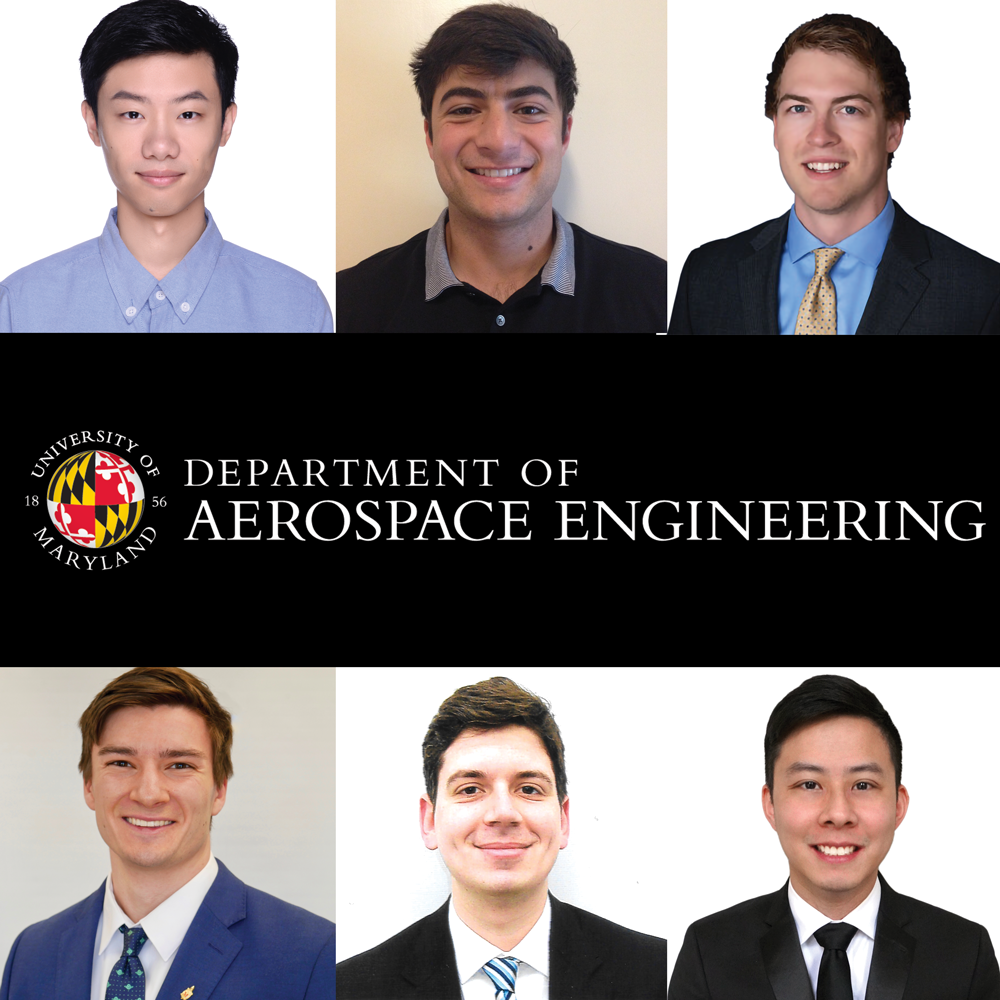Six UMD Students Win VFS Vertical Flight Foundation Scholarships
Six University of Maryland (UMD) Department of Aerospace Engineering graduate students have won 2021 Vertical Flight Society's (VFS) Vertical Flight Foundation Scholarships. VFS awarded 27 total scholarships this year in recognition of the world’s most talented engineering students interested in vertical flight. “Since 1977, our Vertical Flight Foundation Scholarships have helped inspire generations of students to pursue careers in vertical flight, with many now holding leadership positions in industry, academia and government, with more 600 scholarships awarded to date,” said VFS Executive Director Mike Hirschberg in the organization’s press release. Cheng Chi received the Raymond W. Prouty Scholarship, which honors the memory of a pioneering helicopter engineer with a lifelong commitment to educating the rotorcraft community. Cheng is a fourth-year Ph.D. candidate working in UMD’s Alfred Gessow Rotorcraft Center under the supervision of Dr. Anubhav Datta. His research focuses on the aeromechanics of advanced rotor blades, including blades with swept or anhedral tip and ultra-thin Martian rotor blades. He was a key member of UMD’s graduate student design team in 2018 that won first place with their Metaltail UAV design in the Vertical Flight Foundation’s Student Design Competition. Upon completing graduate school, he would like to become a helicopter structural dynamics engineer and continue contributing to the rotorcraft society. Ravi Lumba received the M. A. "Tony" McVeigh Scholarship, which honors the memory of the Boeing advanced rotorcraft designer and mentor. Lumba is a Ph.D. student working under the advisement of Dr. Anubhav Datta. His research deals primarily with parallel structural analysis with specific applications for the field of rotorcraft. Currently, the most advanced structural analysis codes can take a long time to run, resulting in lower fidelity codes being used. Lumba’s work looks to address this by developing parallel algorithms that can make these advanced methods usable for design purposes. His post-graduation goals are to continue to develop tools that can continue to revolutionize the rotorcraft field by making it more efficient, more capable, but most importantly safer. Nicholas Rehm received the John J. "Jack" Fetsko Scholarship, which honors the helicopter operations pioneer and leader. Rehm is a second-year master’s student and research assistant studying rotorcraft under Distinguished University Professor Inderjit Chopra in the Alfred Gessow Rotorcraft Center. H is research includes flight control and stabilization of small hovering unmanned aerial vehicles, extending into advanced sensing and implementation of autonomous control strategies. In the future, Rehm aims to keep expanding the capabilities and usefulness of aerial robots through the use of emerging technologies such as artificial intelligence to enhance onboard sensing and data management. Peter Ryseck received the Alfred and Elaine Gessow Scholarship, which honors a pioneer in the helicopter field at NACA/NASA and founder of the University of Maryland rotorcraft center. Ryseck is a DEVCOM Army Research Lab Journeyman Fellow, Vertical Flight Foundation Fellow, and master’s student studying rotorcraft with a focus on the aeromechanics of eVTOL (electric vertical take-off and landing) vehicles under advisors Dr. Inderjit Chopra and Dr. Derrick Yeo. Throughout his undergrad time at UMD, Ryseck focused on broadening the flight envelope of multi-mode UAS through morphing aerodynamic elements. As a master’s student, Ryseck is exploring potential combinations of UAS path planning techniques and aerodynamic analyses in future clean energy aerial system applications. He is currently focused on leading a wind tunnel test campaign at the Glenn L. Martin Wind Tunnel to characterize existing UAS platforms with a view to develop the next generation of tactical aerial systems. After graduation, he would like to pursue opportunities that accelerate the transition towards zero-emission vehicles. James Sutherland received the Hal Andrews Scholarship, which remembers a preeminent Navy aviation engineer, advisor and historian. Sutherland is a fourth-year Ph.D. student working in the Alfred Gessow Rotorcraft Center under the advisement of Dr. Anubhav Datta. His research is focused on fabricating, modeling, and testing advanced geometry rotor blades for the Maryland Tiltrotor Rig installed in the Glenn L. Martin Wind Tunnel. The goal of these blades is to alleviate dynamic instabilities and enable tiltrotors to fly at over 400 knots. Last year, he was the team captain for UMD’s VFS Student Design Competition Graduate Team which won 1st Place in the Leonardo’s Aerial Screw: 500 Years Later challenge. Before starting his Ph.D. research in June of 2017, Sutherland graduated from Villanova University with a bachelor’s degree in mechanical engineering and mathematics. Upon graduation, Sutherland aims to be the lead engineer in charge of designing the rotors for the next generation of rotorcraft. Frederick Tsai received the John W. Sobczak Scholarship, honoring the memory of the US Army applied aviation technology engineer. Tsai is a fifth-year Ph.D. student in the Alfred Gessow Rotorcraft Center under the direction of Dr. Anubhav Datta. His research focus is to investigate how to get tiltrotor aircraft to fly faster than they currently do. To do this, Tsai evaluates a 4.75 ft. diameter tiltrotor model, called the Maryland Tiltrotor Rig (MTR), through whirl flutter testing at the Glenn L. Martin wind tunnel on campus. “I am excited about the prospect of working with engineering teams to design, build, test and deploy the next generation of civil and military aircraft,” said Tsai on looking ahead to post-graduation. “I hope to have a long career in research and development of advanced aerial vehicles, and eventually, to turn my focus to the next generation of aeronautical engineers by teaching courses in universities.” This year’s awardees will be recognized at the VFS Grand Awards Ceremony during the Vertical Flight Society’s 77th Annual Forum & Technology Display taking place virtually from May 10-14, 2021.
April 13, 2021 Prev Next |


